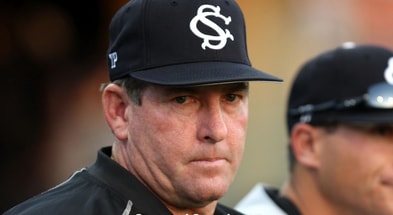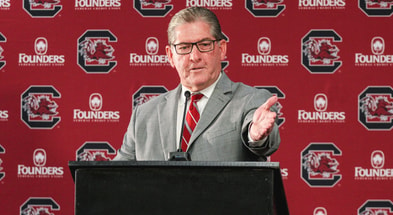'They can finish their story': How three Chapin pitchers are helping South Carolina baseball in 2023

March 13, 2020. It’s the day that everything changed.
Chapin High School baseball was on a roll as the No. 11 team in the nation. It was looking to finish off a sweep of Dutch Fork. Junior left-hander Matthew Becker was slated to start.
The quest to win a second state championship in three years was within reach.
But just one day earlier, the United States issued the first coronavirus-related activity restrictions. Rumors had been circulating that the baseball season might be canceled with a pandemic looming. Sooner or later, the world was going to look a lot different.
With so much uncertainty in the air, Chapin played on. The guys on the team had no other choice but to. Becker was pitching a gem heading into the seventh inning. He looked to be on his way to throwing a complete game.
But as his teammates ran onto the field for the seventh, he wasn’t heading out to the mound.
“He said to let Chris Veach close it out because he was a senior and this would be his last game,” said Chapin head coach Scott McLeod. “Chris went in and slammed the door and that was the end of the season.”
Those were the last pitches of a potentially historic run for three now Gamecocks–Becker, Veach and Cade Austin–with the COVID-19 pandemic wiping out any hope of another championship run.
[Subscribe to Gamecock Central until Aug. 31 for only $29.99!]
It was the end of the road for seniors like Veach and Austin, who Becker had played with since middle school.
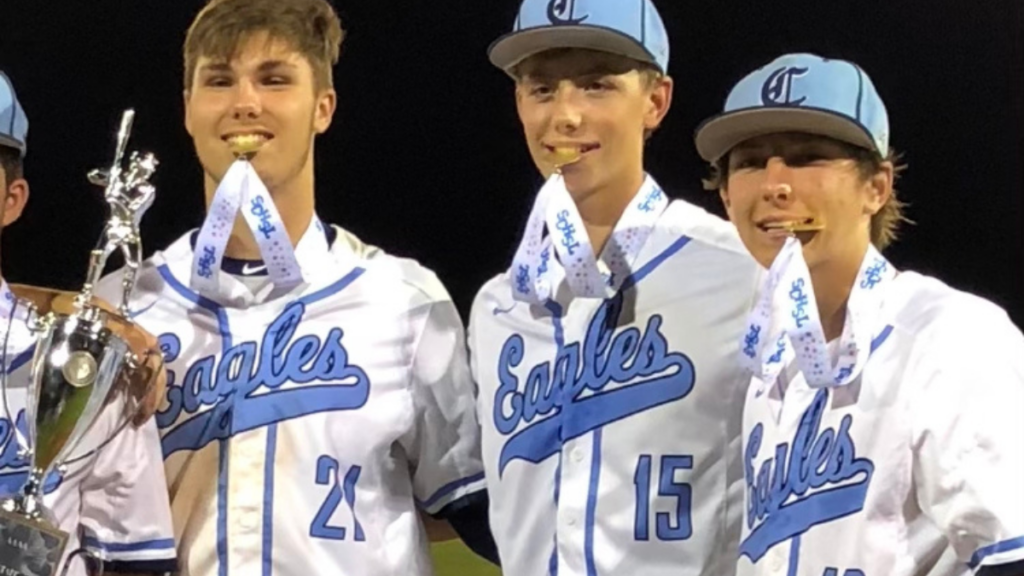
“I just remember it being gut-wrenching,” said Chapin assistant coach Malcolm McLeod. “We had our sights set on another state title. We were off to such a hot start and we knew what kind of team we had. Groups like that don’t come around very often. Obviously, there was a bigger issue at play with COVID, but my heart went out to all the seniors on that team. Still haunts us all to this day.”
All three went their separate ways after that season, Austin and Veach leaving Becker at Chapin while they began careers at South Carolina and Presbyterian, respectively. As COVID-19 slowed down, Becker was able to play his senior season with the plan of joining Austin at South Carolina the following year.
Veach began his career with the Blue Hose, pitching and playing the field before an elbow injury in 2022 put him on the shelf.
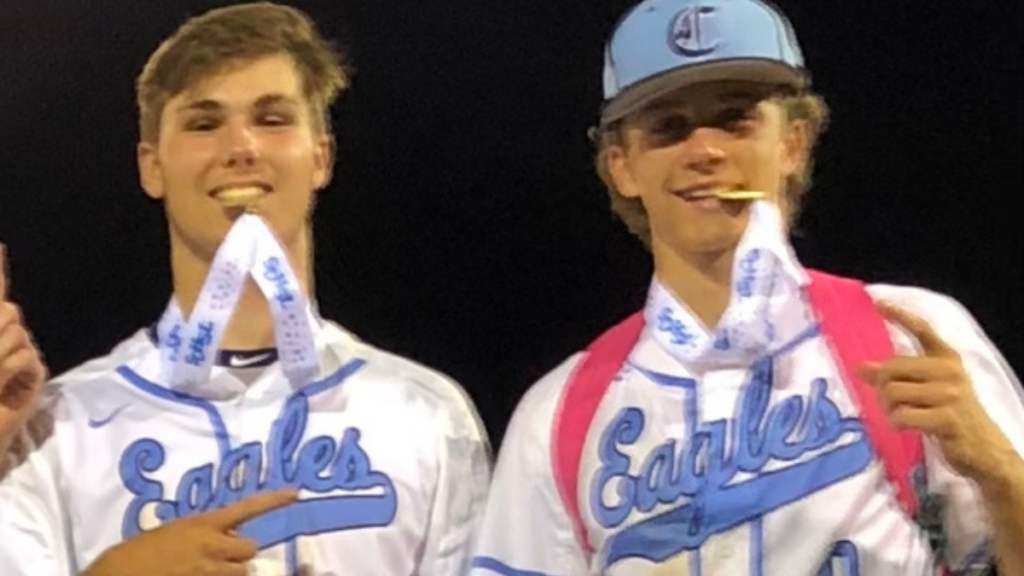
After the 2022 season, Veach entered the transfer portal in search of a new home. He didn’t have to go very far to find what he was looking for.
He transferred to South Carolina, reuniting with two of his high school teammates.
“Those are friends from high school. We grew up playing baseball and we worked out (together) and I hung out with them a lot,” Veach said. “It’s really cool to go away to college for two years and reconvene with them to play baseball again.”
This is the story of how three pitchers from a small town in South Carolina have come back together to try and get the Gamecocks back to the College World Series.
From camper to Carolina
It was nothing new for Scott. He had seen it before.
On a rare night that didn’t involve coaching at Chapin, Scott found time to watch Veach and South Carolina play Mississippi State in March. What came next wasn’t much of a surprise.
As Veach struck out Hunter Hines looking, he strutted off the mound to the patented Connor McGregor walk, his legs out on front of his torso and his arms flapping behind him while striding to the dugout.
After the game, Scott sent Veach a text with some words of advice.
“I told him, yeah you keep it up,” he said. “I said, ‘Somebody’s going to hit a bazooka off of you and I want to see you do that little walk when you come off the mound.'”
Scott, who had known Veach for years as his coach, knew of these celebratory antics. It’s just who Veach always been — the guy with an “I’m better than you, cocky attitude.”
To understand where his personality comes from, you have to go back to his earliest years in baseball. Scott and his son Malcolm host a summer baseball camp at Chapin every summer. And every summer, Veach and his older brother Erik were always in attendance.
“Chris was like six years old and I was in college working the camp,” Malcolm said. “And he just loved it. Seemed like he came out of the womb that way. Just born to play the game.”
Baseball has always run through Veach’s veins. He could never get enough of it.
“We’d do three hours of baseball camp and then they had a baseball field made in their yard. When he got through the baseball camp, he was lining up some of the little campers and invited them over to his house to come play some more baseball,” Scott said.
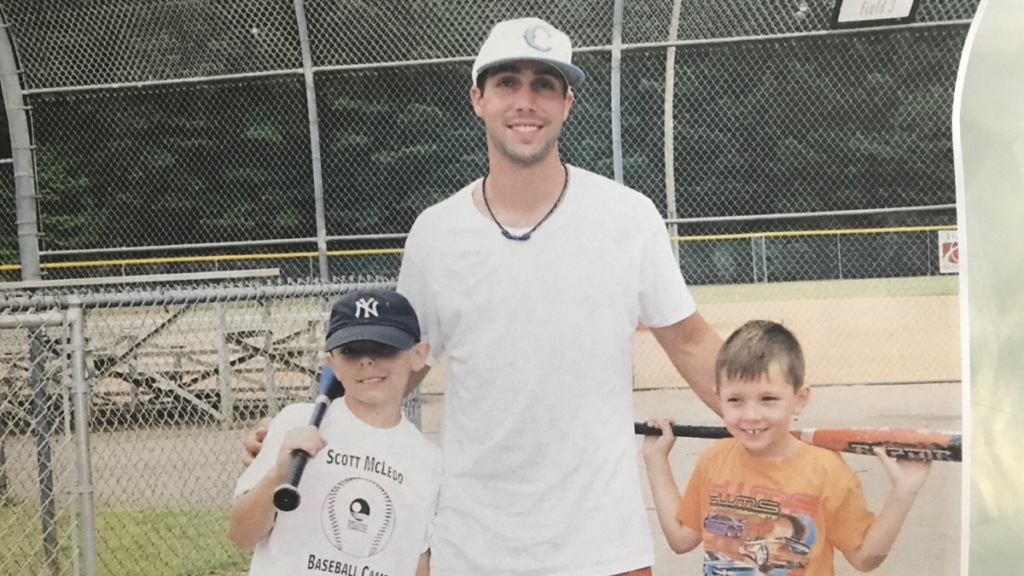
Even after Veach outgrew camper status, his time with the McLeods wasn’t over. He played for Malcolm on Chapin’s middle school team before skipping JV baseball altogether and jumping to the varsity squad.
It wasn’t hard for them to recognize the same kid who used to dive for every ball coming his way at shortstop.
“He’d leave practice and be filthy. I mean, he’s diving for everything, he was going to catch every ball, hit every ball,” Scott said. “Me and Malcolm talked about it, we said, ‘That kid’s going to be special. He’s going to be pretty good.’ And he was.”
By the time his high school career came to an end, Veach was named to All-Region and All-State teams. He was the fourth-ranked shortstop in the state by Perfect Game.
While he’s turned himself into a premier college pitcher, it was his play at shortstop that impressed at Chapin.
“He was such a good hitter in high school. I mean, he was such a good shortstop. We didn’t want to put him on the mound unless we had to,” Scott said. “He was a great hitter, one of our leading hitters on those teams.”
[Become an NIL supporter of your South Carolina Gamecocks!]
Veach’s presence at shortstop was so important to those Chapin teams, he was even perceived as the “captain of the infield.”
“Chris walks into a room, he’s like Larry Bird. He walks into a room and says who’s playing for second,” Scott said. “That’s who Chris is. There was no doubt he was going to be the leader of that infield. I mean, like I said, if you weren’t getting it done at practice, he’d let you know about it. I didn’t have to do a whole lot of yelling. He did it for me.”
And so far, those leadership qualities have translated nicely to South Carolina.
While he’s not playing shortstop anymore, Veach has turned himself into the Gamecocks closer with a 1.69 ERA against SEC competition.
His changeup is arguably one of the best in the country, contributing to 21 strikeouts and just a .175 batting average against in SEC play.
“Yeah, I’ve probably swung at it when it hit the grass like 70 feet in front of home plate,” said Ethan Petry, the Gamecocks’ top slugger this season. “You just can’t see it out of the hand. It’s just like it goes into another dimension. It just comes out and you can’t even see it.”
After finishing off a sweep of the Florida Gators, Veach turned to the visiting dugout and sequenced his fingers to count to three. It was a subtle representation of how many wins the Gamecocks just picked up against their SEC rival.
“I love Chris Veach, man. I love him to death, love all the antics,” pitching coach Justin Parker said. “Don’t care what he does. I love the competitor. I prefer him to stay more so with our side, not necessarily talking too much trash directly to the opponent, but I love the energy, man.”
Some might not appreciate Veach’s style of play, and that’s perfectly fine with him. It’s just more fuel to the fire burning inside of him.
“I think the more people doubt him or the more they hate him the better he plays. He thrives off of that,” Malcolm said.
A childhood dream realized
Laurie and Mark Becker did things the old fashion way. They didn’t believe in spending thousands of dollars or driving all over the place to summer camps.
They just knew if their son, Matthew, was good enough at what he did, someone would recognize his talent.
And that someone would be Paul Scheno, who coached the Diamond Devils travel baseball team. He was responsible for getting Becker onto his team, thus giving him a jump in baseball.
Becker joined the team as a pitcher, hoping to be one of the 600 guys to come through and play college baseball and one of the even fewer to go pro. He played in multiple tournaments throughout South Carolina. At one of his games, he caught the attention of then-Clemson head coach Monte Lee.
Lee was impressed with Becker’s stuff but wanted to see if he could do more before offering him.
“He was a sophomore at the time, so he’s like, ‘If he can get his velocity to the high 90s, we’ll look at him next year. We need to see him grow,'” Laurie said. “We’ll see what he does during his junior year of high school, basically.”
So that’s what Becker did. After primarily playing first base and waiting behind experienced starters for two years, he got his chance to pitch at Chapin.
“I think it taught him a lot of patience you know and that in appreciation that you have to wait your turn,” Laurie said. “But I think knowing that he was contributing to the team, in the role of a first baseman and as a position player, I think it gave him a little bit more confidence knowing, hey, they need me I’m contributing. And when I can pitch, when I get better and I get stronger, and I’m older, and it’ll become my turn. I’ll get my turn.”
[Get South Carolina baseball news and analysis via email]
Becker continued to morph into a top-tier high school arm at Chapin. After watching his junior season cut short by COVID-19, he took his game to the next level as a senior.
He became the new single-season record holder for strikeouts with 94 in 44.2 innings pitched in 2021.
“I mean, the velocity, the breaking ball that was always there,” Malcolm said. “As he got a little stronger, all of a sudden, it just flipped and he started pounding the strike zone with three pitches. And at that point, we knew when this guy is on the mound, we got a chance because no one is going to hit that.”
Becker always seemed focused on the task at hand. He wasn’t the talkative type. When he was on the mound, his pitching would speak for itself.
“Before Chapin was going to play another local high school, and I’m not going to name any names here, Matthew said that he was going to destroy them. And he told me why, he reflected back to when he was like, I think 12 years old. And this particular coach he was going against cut him from the travel ball team. I think he struck out 13 or 14, or something like that. And the coach tried to talk to him and Matthew just blew him off, didn’t give him the time of day,” said Shane Miller, Becker’s trainer at Athlete’s Arena.
“But that’s the competitor in Matthew. It’s interesting because you won’t get that idea, that notion about him if you’re just speaking casually with him outside of baseball, or even if you’re in the weight room. At least when he was with me, he was very I’m going to get my work done kind of guy. He would talk a little bit and have a conversation but for the most part, he comes in and he’s dialed, he’s in the zone kind of dialed into what he’s trying to accomplish that day.”
Becker was now one of the top pitchers in the state. He was ranked as the No. 2 left-handed pitcher and No. 15 player in South Carolina by Perfect Game.
That’s when offers started coming in from Clemson and Charleston. While excited to be on the radar of multiple schools, his dream was to play for the Gamecocks.
His affection for South Carolina started when he met Jackie Bradley Jr. after winning the College World Series in 2010. Becker would go on to be a bat boy for the program during his middle school days.
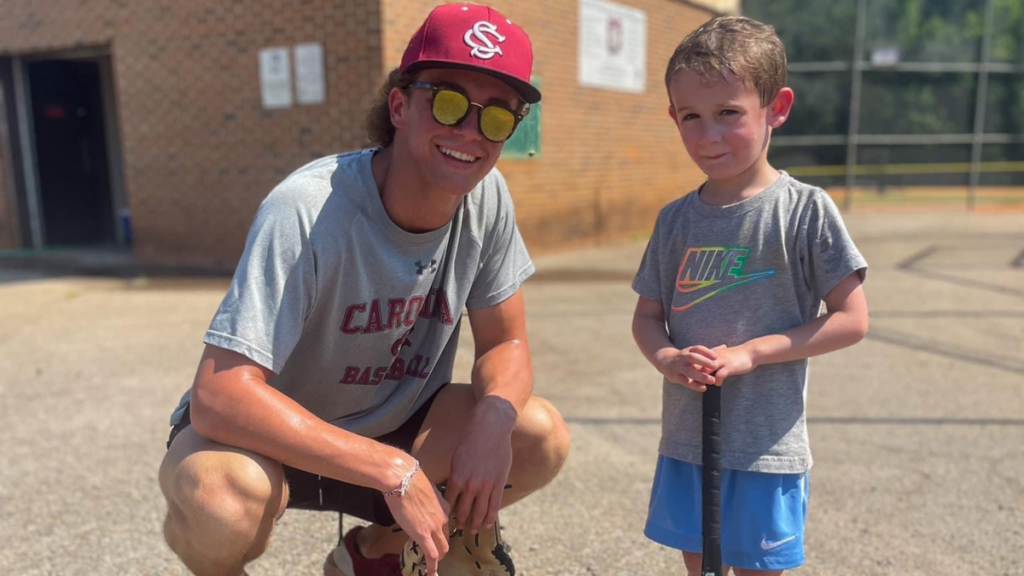
“He was just like, ‘I could get a better offer but it doesn’t matter, I want to play for Carolina,'” Laurie said. “He grew up with it. Met somebody at seven who changed everything he did about baseball from then on out, and then did the whole bat boy thing, and then gets an offer, and now he’s playing for them.”
It was a feel-good story at the time but now Becker had to prove he belonged with a loaded pitching staff. He started out as a freshman reliever pitching a couple of innings. But injuries plagued the pitching and forced him into making his first career start against top-ranked Texas.
“I don’t think he would have obviously done as much as he did had they been healthy,” Laurie said. “But when he was forced in that role, it was it was kind of exciting because you knew he could do it.”
Top 10
- 1
Reed Sheppard
Shows support for John Calipari
- 2New
Tampering concerns
Nebraska likely to cancel spring game
- 3
Caleb Love headbutted
Multiple ejections in Arizona
- 4Hot
Bobby Hurley
Refuses handshake line
- 5
OSU assistant to NFL
Ohio State offensive coach to Cardinals
Get the On3 Top 10 to your inbox every morning
By clicking "Subscribe to Newsletter", I agree to On3's Privacy Notice, Terms, and use of my personal information described therein.
Becker put up six innings of one run-ball, striking out 11 and walking three against an offense not a lot of teams could figure out en route to a South Carolina win.
That was a the start of a promising freshman year for Becker, who has now turned into one of the Gamecocks’ go-to arms and only left-handed option.
Now, in his second year, it’s been much of the same for him. He started the season out in the bullpen but moved back into the rotation with an injury to Noah Hall. He’s been one of South Carolina’s primary starters since early April.
“He’s always been in the mix to do it. He did it last year,” Parker said. “He’s got unique stuff and he’s obviously left-handed on a staff that’s primarily right-handed. We felt like going into this year, if Becker was going to be in the mix to start, we were a better club. Just felt like our rotation would be more diverse.”
Patience paying off for Austin
Austin had everything one could want out of a young pitcher. He had good size, strength and could throw hard.
The only thing missing was a back pocket pitch to get hitters out.
Jason Jolley, a teacher and coach at Chapin, started working with Austin when he was around eight or nine years old. Over the years, he helped Austin develop a true breaking pitch.
“He didn’t know if he wanted a curveball and slider. I said, ‘Cade, you can’t throw both. You’ve got to pick one,'” said Jolley, who would sit on a bucket and catch Austin’s pitches. “We’ve got to figure one out.”
Just like with trying anything new, there were some growing pains.
“I would sit on a bucket and I’d go home and show my wife that I’ve got stitches in my shins and big knots on me and stuff where he’s spiking them into the ground in front of me and I can’t move,” Jolley said. “Those are good times.”
Austin kept working at it, not wanting to mess around. Nothing but business. Once his mechanics developed over time, he became nearly unhittable.
“I’m catching balls that are moving across the plate and I’m like, ‘What the hell was that? That ball is moving six, seven inches and you’re throwing it 90 miles an hour,'” Jolley said.
This was true from an early age. His talents started to be realized as an eighth grader at Chapin Middle School.
Chapin’s varsity team was playing in a spring break tournament in Camden. They had already played four games and were low on pitching.
That’s when Scott called his JV coach, Jody Haltiwanger, to see who was available to pitch. But Haltiwanger had used up all his pitching in a tournament, too. He was left with no other option than to see who could pitch from Chapin’s middle school team.
“I called Malcolm and I said, ‘Man, we need a pitcher.’ He said take Cade,” Scott said. “So we took Cade Austin and put him on the mound in the Camden tournament for the championship and he just blows them away.”
It signaled the beginning of Austin’s blossom into a dominant varsity pitcher. He was Chapin’s ace during its championship season in 2018. He was only a sophomore.
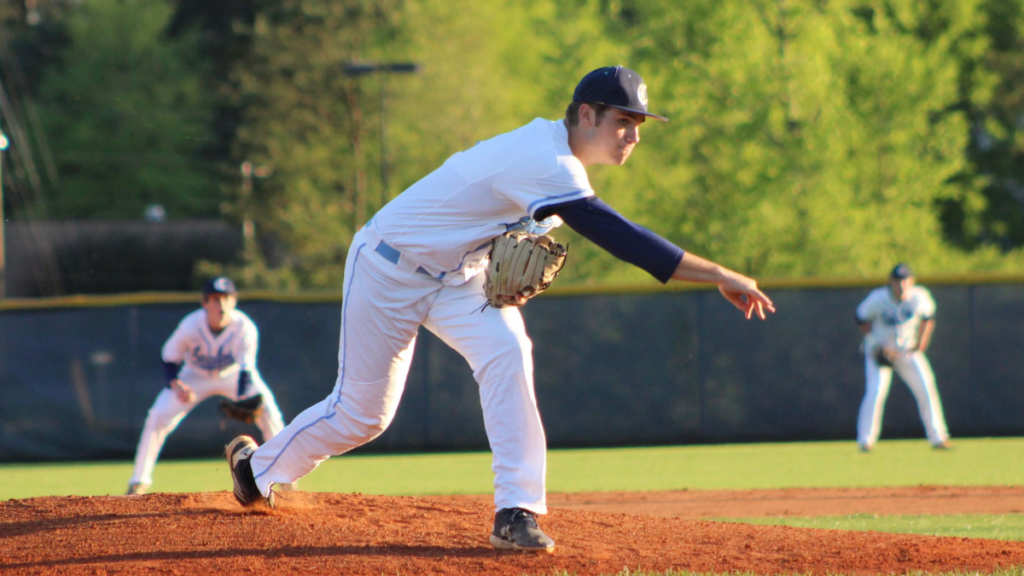
As a junior, he went 6-1 with a 1.61 ERA and 59 strikeouts in 43.1 innings pitched. By that point, he had already asserted himself as a future college arm.
College offers began rolling in as early as his freshman year. Two schools that were highly interested in Austin were Clemson and South Carolina.
“After the Palmetto Games, I get a phone call from a guy in the dugout. He said, ‘What would you say about an offer from Clemson? I said, ‘Well, you know, it’s not up to me. It’s up to Cade if he wants to go,'” said Darrell, Austin’s father. “After the game was over, I stand up waiting on Cade, and he comes running up. And he said, ‘The coaches want to talk to me,’ and I’m assuming that was Clemson.”
Only it wasn’t Clemson that wanted to speak with him. Instead, it was Jerry Meyers, who was South Carolina’s pitching coach up until 2017. A confused Darrell and his son spoke with Meyers and never got the chance to speak with anyone from the Tigers that day.
[Subscribe for free to Gamecock Central’s YouTube page!]
It would’ve been easy for Darrell to sway his son to become a Gamecock. He played on South Carolina’s offensive line in the early 1970s and was a team captain. But he didn’t want to make it about himself.
“It was his decision,” Darrell said. “Don’t pick Carolina just because of me. You’re the one that’s going to have to put the time and work in to get to play and get an education.”
Ultimately, Austin chose the Gamecocks, becoming one of the first commits in the Kingston era in August 2017.
Between high school and redshirting as a freshman, it would be nearly five more years before Austin took the mound for the first time at South Carolina.
After years of waiting, it was time to see what he could do. But it didn’t go as planned. He gave up six runs on five hits while walking three and striking out one in 1.2 innings on Opening Day. He wouldn’t be able to close the game out. It ended up taking two more pitchers to get the final out of a 9-7 win.
“I think hitting the big stage got him too dang nervous,” Darrell said. “I kept asking, ‘Man, were you nervous? No, no. Yeah, right.’ I remember my first game at Williams-Brice. I almost wet my pants. I was so nervous.”
Eventually, Austin’s nerves settled down and he began pitching better. He became a go-to arm out of the bullpen, finishing with a 3.17 ERA while striking out 55 across 54 innings. The Gamecocks are going to need him even more heading into this postseason run.
“Cade is one of the toughest guys we have. The numbers may not suggest this, but Cade is a guy we all have tremendous faith and confidence in,” Parker said. “He’s another guy that I think if you ask him he still hasn’t pitched his best yet, but at the same time, he’s one of the toughest guys we’ve got, especially when you talk about nailing down the eighth or ninth inning. Those are the six hardest outs to get in the game, and he’s the guy we have a lot of faith in to do that.”
A second chance
COVID-19 derailed what could have been something special for Chapin. But with Veach, Becker and Austin back together, they’ve got a chance to pick up where they left off.
“Now they can finish their story,” Darrell said. “They got cheated out of what could have been in 2020. So now they get to continue the story, and hopefully we’re going to have a really good ending to this season.”
With their help, South Carolina is back to playing meaningful baseball this season. The Gamecocks are a top 16 seed for the first time since 2016 and have been at times one of the best teams in the country.
“It kind of feels like high school,” Becker said. “I grew up with them, grew up with Cade. Both great dudes, both great pitchers, obviously. It’s really awesome to have them behind us.”
The Chapin community has also been following along as three of their former pitchers are succeeding at the next level.
“All those families definitely are super supportive and are now following the team where they had not maybe done so before,” Laurie said. “That’s probably the best part about it is when you get three kids from your hometown playing for the hometown team right down the street. That’s got to be the coolest part of it all.”
It’s a testament to how much the coaching staff has invested in homegrown talent. South Carolina has 11 players on its roster from within the state, many of whom have made a substantial impact this year.
If there’s one thing Kingston has learned from recruiting, it’s to start local then branch out.
“We’ve got some great players from in the state and locally. Obviously, Chapin has been very good to us as of late on our pitching staff,” Kingston said. “We have a lot of respect for the state, for the coaches in our state — both travel and high school. And so when there are good players in our state that we think can help us get to Omaha, we’re going to recruit them hard.”







